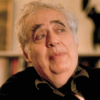Harold Bloom

Harold Bloom
Harold Bloomis an American literary critic and Sterling Professor of Humanities at Yale University. Since the publication of his first book in 1959, Bloom has written more than 20 books of literary criticism, several books discussing religion, and a novel. He has edited hundreds of anthologies concerning numerous literary and philosophical figures for the Chelsea House publishing firm. Bloom's books have been translated into more than 40 languages...
NationalityAmerican
ProfessionTeacher
Date of Birth11 July 1930
CountryUnited States of America
I am not unique in my elegiac sadness at watching reading die, in the era that celebrates Stephen King and J.K. Rowling rather than Charles Dickens and Lewis Carroll.
Reading well is one of the greatest pleasures that solitude can afford you.
We all fear loneliness, madness, dying. Shakespeare and Walt Whitman, Leopardi and Hart Crane will not cure those fears. And yet these poets bring us fire and light.
Criticism in the universities, I'll have to admit, has entered a phase where I am totally out of sympathy with 95% of what goes on. It's Stalinism without Stalin.
All that a critic, as critic, can give poets is the deadly encouragement that never ceases to remind them of how heavy their inheritance is.
There is no method except yourself.
Reading the very best writers—let us say Homer, Dante, Shakespeare, Tolstoy—is not going to make us better citizens. Art is perfectly useless, according to the sublime Oscar Wilde, who was right about everything. He also told us that all bad poetry is sincere. Had I the power to do so, I would command that these words be engraved above every gate at every university, so that each student might ponder the splendor of the insight.
What matters in literature in the end is surely the idiosyncratic, the individual, the flavor or the color of a particular human suffering.
Socrates, in Plato, formulates ideas of order: the Iliad, like Shakespeare, knows that a violent disorder is a great order.
We can be reluctant to recognize how much of our culture was literary, particularly now that so many of the institutional purveyors of literature happily have joined in proclaiming its death. A substantial number of Americans who believe they worship God actually worship three major literary characters: the Yahweh of the J Writer (earliest author of Genesis, Exodus, Numbers), the Jesus of the Gospel of Mark, and Allah of the Koran.
I think the Greek New Testament is the strongest and most successful misreading of a great prior text in the entire history of influence.
At our present bad moment, we need above all to recover our sense of literary individuality and of poetic autonomy.
The idea of Herman Melville in a writing class is always distressing to me.
I won't say he [Shakespeare] 'invented' us, because journalists perpetually misunderstand me on that. I'll put it more simply: he contains us. Our ways of thinking and feeling-about ourselves, those we love, those we hate, those we realize are hopelessly 'other' to us-are more shaped by Shakespeare than they are by the experience of our own lives.